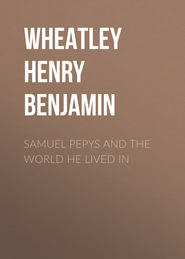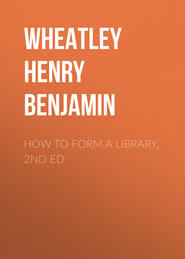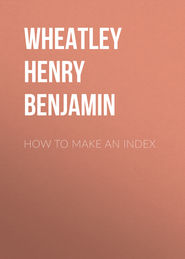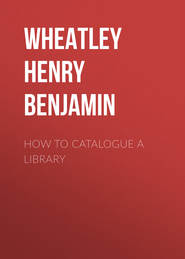По всем вопросам обращайтесь на: info@litportal.ru
(©) 2003-2024.
✖
Prices of Books
Автор
Год написания книги
2018
Настройки чтения
Размер шрифта
Высота строк
Поля
In taking note of some of the old second-hand booksellers, special mention must be made of Joseph Kirton of St. Paul’s Churchyard, whose sign was “The King’s Arms,” because he was Samuel Pepys’s bookseller—“my poor Kirton,” as the latter calls him when he was ruined by the Fire of London. Pepys tells us that “Kirton was utterly undone by the loss of all his stock, so that from being worth seven or eight thousand pounds, he was made two or three thousand pounds worse than nothing.” (See “Diary,” October 5, 1666.) The poor bookseller did not live long after his great loss, for he died in October 1667. Pepys records an interesting instance of the rise in price of one of the books burnt in the great fire. On March 20, 1666-67 he writes: “It is strange how Rycaut’s ‘Discourse of Turky,’ which before the fire I was asked but 8s. for, there being all but twenty-two or thereabouts burned, I did now offer 20s., and he demands 50s., and I think I shall give it him, though it be only as a monument of the fire.” On April 8, 1667, he gives us some fuller particulars, which are of interest: “So I away to the Temple, to my new bookseller’s; and there I did agree for Rycaut’s late ‘History of the Turkish Policy,’ which costs me 55s.; whereas it was sold plain before the late fire for 8s., and bound and coloured as this for 20s., for I have bought it finely bound and truly coloured, all the figures, of which there was but six books done so, whereof the King and Duke of York, and Duke of Monmouth and Lord Arlington had four. The fifth was sold, and I have bought the sixth.” There is no copy of this edition in the British Museum.
John Dunton, the erratic bookseller and projector of the eighteenth century, has left us in his “Life and Errors” a most curious account of the booksellers of his time, who are all, oddly enough, either handsome themselves or have beautiful wives. Nearly all are also eminent Christians; in fact, we are told that of three hundred booksellers trading in country towns the author knew not of one knave or blockhead amongst them all.
Thomas Osborne, the most celebrated bookseller of his day, is interesting to us as having had the honour of being knocked down by Dr. Samuel Johnson. Whether or no he deserved such a summary punishment we cannot now tell, but although he appears to have been more of a business man than a literary character, what he did is sufficient to place him in an honourable position in the history of English bibliography. He bought the finest library of the time, and sold it piecemeal at reasonable prices. He employed two of the most capable men of his day—Johnson and Oldys—to make a Catalogue, which does credit to all concerned in its production, and he did not make much money by the transaction. The amount he gave for the Harley library in 1742 (£13,000) was less by £5000 than the binding of a portion of the library had cost, but had he given more he would certainly have been a loser. Osborne projected a Catalogue, in which it was proposed “that the books shall be distributed into distinct classes, and every class arranged with some regard to the age of the writers; that every book shall be accurately described; that the peculiarities of the editions shall be remarked, and observations from the authors of literary history occasionally interspersed, that by this Catalogue posterity may be informed of the excellence and value of this great collection, and thus promote the knowledge of scarce books and elegant editions.” Maittaire drew up the scheme of arrangement, and wrote the Latin dedication to Lord Carteret, who was then Secretary of State. Dr. Johnson wrote the “Proposals” for printing the Bibliotheca Harleiana, which afterwards were prefixed to the first volume. But in spite of having such eminent helpers, Osborne had to give up his project of an annotated Catalogue, and he informed the public in the preface to the third volume of his failure—
“My original design was, as I have already explained, to publish a methodical and exact Catalogue of this library, upon the plan which has been laid down, as I am informed, by several men of the first rank among the learned. It was intended by those who undertook the work, to make a very exact disposition of all the subjects, and to give an account of the remarkable differences of the editions, and other peculiarities, which make any book eminently valuable; and it was imagined that some improvements might, by pursuing this scheme, be made in Literary History. With this view was the Catalogue begun, when the price [5s. per volume] was fixed upon it in public advertisements; and it cannot be denied that such a Catalogue would have been willingly purchased by those who understood its use. But when a few sheets had been printed, it was discovered that the scheme was impracticable without more hands than could be procured, or more time than the necessity of a speedy sale would allow. The Catalogue was therefore continued without notes, at least in the greatest part; and though it was still performed better than those which are daily offered to the public, fell much below the original intention.”
The public were not very grateful for what they did receive, and resented Osborne’s charge of five shillings a volume for the Catalogue, which seems reasonable enough now, but was then denounced as “an avaricious innovation.” In answer to the clamour the bookseller announced that “those who have paid five shillings shall be allowed at any time within three months after the day of sale either to return them in exchange for books, or to send them back and receive their money.” Another complaint was that the books were priced too high. As this was a serious charge, Osborne got Johnson to put his answer into sonorous language, that would at least make the complainers ashamed of themselves: “If, therefore, I have set a high value upon books, if I have vainly imagined literature to be more fashionable than it really is, or idly hoped to revive a taste well-nigh extinguished, I know not why I should be persecuted with clamour and invective, since I shall only suffer by my mistake, and be obliged to keep those books which I was in hopes of selling.”
Dibdin proves that this charge of over-pricing is quite unjust. He writes: “Whoever inspects Osborne’s Catalogue of 1748 (four years after the Harleian sale) will find in it many of the most valuable of Lord Oxford’s books; and among them a copy of the Aldine Plato of 1513 struck off upon vellum, marked at £21 only—for this identical copy Lord Oxford gave 100 guineas, as Dr. Mead informed Dr. Askew; from the latter of whose collections it was purchased by Dr. Hunter, and is now in the Hunter Museum. There will be found in Osborne’s Catalogues of 1748 and 1753 some of the scarcest books in English literature marked at 2 or 3 or 4s. for which three times the number of pounds is now given.”[10 - Bibliomania, Part V.] Dibdin has given a useful analysis of the contents of the Harleian Library in his Bibliomania. Osborne published a large number of catalogues full of literary curiosities, and with interesting notes and prefaces. In Mr. Thorpe’s Catalogue of 1851 there is a notice of a set of Osborne’s Catalogues from 1729 to 1768, in forty-three volumes octavo. This famous bookseller died on 27th August 1767, and he is said to have left behind him some forty thousand pounds.
No bookseller has ever been held in higher esteem than Thomas Payne, who was honourably known as “honest Tom Payne.” Payne’s shop at the Mews Gate, where the National Gallery now stands, was for years the great afternoon resort of the chief book collectors. Here met such men as Cracherode, George Steevens, Malone, Lord Spencer, Grenville, Bishop Dampier, Towneley, and Colonel Stanley. Payne lived at the Mews Gate for forty years, having commenced business as an assistant to his elder brother, Oliver Payne. Thomas’s first catalogue, when he set up for himself, is dated 1740. He removed to Pall Mall, and retired from business in 1790. He died in 1799, at the age of eighty-two. He was succeeded by his son, who, in partnership with Henry Foss, carried on a first-rate bookselling business in Pall Mall for many years. The catalogue of the Grenville Library was made and published by them.
George Nicol, styled by Beloe in his Sexagenarian “a superb bookseller,” was a man of great influence in his day. He was largely instrumental in the purchase of much of two magnificent libraries—those of George III. and the Duke of Roxburghe—and he was highly esteemed by both his employers. He always spoke of the King as his beloved master. It was he who induced R. H. Evans, the bookseller, to adopt the business of an auctioneer by offering him the sale of the Roxburghe library.
Another bookseller who occupies a prominent position in the roll of learned and high-principled members of the calling was Thomas Rodd, of Great Newport Street. His catalogues were of great interest, and he numbered among his customers most of the book-collectors of his time. Lord Campbell referred to him in one of his books as “that very learned and worthy bookseller, my friend Thomas Rodd.”
A rival of Rodd was Thomas Thorpe, who commenced business in Covent Garden, removed to Piccadilly, and in his later days returned to Covent Garden. Thorpe was a masterful man, who carried everything before him, and published a series of valuable catalogues, from which may be obtained a history of prices for many years. Dibdin, in his “Reminiscences” (1806), says, “I know of no such dogged, indomitable energy and perseverance as that of this renowned bibliopolist”; and again, in the preface to his “Library Companion,” he writes, “Mr. Thorpe is indeed a man of might. His achievements at book-sales are occasionally described in the ensuing pages. It is his catalogues I am here to treat. They are never-ceasing productions; thronged with treasures which he has gallantly borne off at the point of his lance, in many a hard day’s fight in the Pall Mall and Waterloo Place arenas. But these conquests are no sooner obtained than the public receives an account of them; and during the last year only, his catalogues in three parts, now before me, comprise not fewer than seventeen thousand nine hundred and fifty-nine articles. What a scale of buying and selling does this fact alone evince! But in this present year two parts have already appeared, containing upwards of twelve thousand articles. Nor is this all. On the 24th day of September, in the year of our Lord 1823, there appeared the most marvellous phenomenon ever witnessed in the annals of bibliopolism. The Times newspaper had four of the five columns of its last page occupied by an advertisement of Mr. Thorpe, containing the third part of his catalogue for that year. On a moderate computation this advertisement comprised eleven hundred and twenty lines.” Greater things have been done since.
The Bohns were mighty booksellers in their time—John the father, and Henry and James the two sons; but Henry Bohn made the greatest name. His famous Guinea Catalogue (“the guinea pig”) was long a marvel, at least in respect to thickness, till Mr. Quaritch decided to far outrival it, and make it appear slim by the side of his huge volumes. Henry Bohn was a remarkable man, and the cultivator of many tastes. In later life he neglected second-hand bookselling for publishing and the selling of remainders. He has already been mentioned as one of the chief of those who have supplied the public with sound cheap literature. Bohn was fond of exhibiting his importance, and when at a book-sale he would, catalogue in hand, inspect the lots far ahead, and occasionally look up and arrest the course of the sale by inquiring of the auctioneer what was the number of the lot then selling.
Mr. Quaritch has outdone all previous booksellers by the grandeur of his catalogues. They have grown in size and importance, until the last General Catalogue, in seven volumes and nine supplements, a large paper copy of which is in the Reading-room of the British Museum, throws all other catalogues into the shade. The volumes containing the various classes into which the catalogue is divided each form a most valuable bibliography and a grand record of the present prices of books.
This is not a history of booksellers, and therefore more need not be said of them here than that a body of men to whom book collectors are greatly indebted may well be proud of numbering in their ranks those already named, as well as the Pickerings, the Lillys, the Boones, the Ellises, and the Bains, upon whose exploits we have not space to enlarge.
AUCTIONEERS
William Cooper, a bookseller in a good way of business at the sign of the Pelican in Little Britain, was the first to introduce into England the practice of selling books by auction, when in 1676 he sold Dr. Seaman’s library, and for some years he was the chief auctioneer in London. His first catalogue—the first sale catalogue in England—is exhibited in the Kings’ Library at the British Museum.
In 1680 Edward Millington, a better known man and a bookseller of standing, took to auctioneering, and he and Cooper together divided the chief business in this department. Other booksellers, such as Moses Pitt, Zachary Bourne, Nathaniel Ranew, Richard Chiswell, and John Dunsmore, Robert Scott, &c., sold books by auction, and Oldys styles Marmaduke Foster, who made the catalogue of Thomason’s Civil War Tracts in twelve folio manuscript volumes, an auctioneer. It is, however, of the two foremost men, Cooper and Millington, that we want to know more, and fortunately a wit of Christ Church, Oxford, George Smalridge, afterwards Dean of Christ Church and Bishop of Bristol, was struck by the humours connected with the sale in 1686 of the stock of a bankrupt Oxford bookseller—Richard Davis, the publisher of several of the Hon. Robert Boyle’s works. Smalridge wrote a skit on the proceedings, under the title of “Auctio Davisiana Oxonii habita per Gulielmum Cooper, Edoar. Millingtonum, Bibliop. Lond. … Londini: Prostant venales apud Jacobum Tonson, 1689.” This was reprinted in Musarum Anglicanarum Analecta, vol. i. 1691.[11 - An annotated translation of Auctio Davisiana was published in “Book-Lore,” vol. iii. p. 166; vol. iv. p. 1. The translator possesses a copy formerly belonging to Bishop Wordsworth of Lincoln, in which is written, in a contemporary hand, ex dono Bibliopolæ Ric Davis.]
The sale, according to Anthony à Wood, took place “in a large stone fabric opposite St. Michael’s Church, in Oxon., near the north gate of the city, called Bocardo” (a prison in the Middle Ages), and apparently it attracted a great deal of attention on account of the novelty of the mode of sale. Smalridge fastened on the salient points, and he has thus given us information respecting the conduct of a sale in the seventeenth century which we should not otherwise have possessed. The persons of the little drama are six Christ Church men—Arthur Kaye, Walter Bacon, Ed. Stradling, George Dixon, Christopher Codrington, and William Woodward—and in the pride of their learning they make sad fun of the pomposity and ignorance of the poor auctioneers. We must, however, remember that this is a satire and a caricature. Cooper is described as “a man of wonderful and notable gravity,” with a monstrous paunch; and Millington as having a Stentor’s lungs and consummate impudence, a very windbag, whose hollow bellows blow lies.
Woodward took the part of Cooper, and Codrington that of Millington, but when these characters were first pressed upon them, the latter urged that “if a book is bad, I cannot pile encomiums on it, and prefer Wither to Virgil, or Merlin to the Sibyls.” We are told that bids of one penny were taken, and that when the third blow of the hammer has been struck the sale was irrevocable. The auctioneers seem to have offended the ears of the Oxonians by saying “Nepŏtis” and “Stephāni.” At the end of the day Woodward is made to say, “I have spoken, I the great Cooper, whose house is in Little Britain.” Codrington recites a long rhodomontade ending thus: “I check myself and put a curb on the runaway muses. But this mallet, the badge of my profession, I affix as a dedicatory offering to this post—To Oxford and the Arts Millington consecrates these arms.” Dunton draws a favourable portrait of Millington in his “Life and Errors.” He says he “commenced and continued auctions upon the authority of Herodotus, who commends that way of sale for the disposal of the most exquisite and finest beauties to their amorosos; and further informs the world that the sum so raised was laid out for the portions of those to whom nature had been less kind: so that he’ll never be forgotten while his name is Ned, or he, a man of remarkable elocution, wit, sense, and modesty—characters so eminently his, that he would be known by them among a thousand. Millington (from the time he sold Dr. Annesly’s library) expressed a particular friendship to me. He was originally a bookseller, which he left off, being better cut out for an auctioneer. He had a quick wit, and a wonderful fluency of speech. There was usually as much comedy in his ‘once, twice, thrice,’ as can be met with in a modern play. ‘Where,’ said Millington, ‘is your generous flame for learning? Who but a sot or a blockhead would have money in his pocket and starve his brains?’ Though I suppose he had but a round of jests, Dr. Cave once bidding too leisurely for a book, says Millington, ‘Is this your “Primitive Christianity?”’ alluding to a book the honest doctor had published under that title. He died in Cambridge, and I hear they bestowed an elegy on his memory, and design to raise a monument to his ashes.” Thomas Hearne does not give him so good a character. He writes under date 13th September 1723: “Though the late Mr. Millington of London, bookseller, was certainly the best auctioneer in the world, being a man of great wit and fluency of speech, and a thorough master of his trade; though, at the same time, very impudent and saucy, yet he could not at the end of the auction, be brought to give an account to the persons who employed him, so that by that means, he allowed what he pleased and no more, and kept a great number of books that were not sold to himself. Whence arose that vast stock of books, though most of them but ordinary, that he had when he dyed, and which, after his death, were sold by auction.”[12 - Reliquiæ Hearnianæ, 1869, vol. ii. p. 172.]
“An Elegy upon the Lamented Death of Mr. Edward Millington, the famous Auctioneer,” alluded to by Dunton, is printed in the “Works of Mr. Thomas Brown,” ed. 1744, iv. p. 320, but the Rev. C. H. Hartshorne quotes it in his “Book Rarities of Cambridge,” 1829, p. 450, from Bagford’s Collection, British Museum, Harleian MSS., No. 5947. It reads as follows:—
“Mourn! mourn! you booksellers, for cruel death
Has robb’d the famous auctioneer of breath:
He’s gone,—he’s gone,—all the great loss deplore;
Great Millington—alas! he is no more:
No more will he now at your service stand
Behind the desk, with mallet in his hand:
No more the value of your books set forth,
And sell ’em by his art for twice the worth.
Methinks I see him still, with smiling look,
Amidst the crowd, and in his hand a book:
Then in a fine, facetious, pleasing way
The author’s genius and his wit display.
O all you scribbling tribe, come, mourn his death,
Whose wit hath given your dying fame new birth.
When your neglected works did mouldering lie
Upon the shelves, and none your books would buy,
How oft has he, with strainèd eloquence,
Affirm’d the leaves contained a world of sense,
When all’s insipid, dull impertinence?
‘Come, gentlemen,—come bid me what you please;
Upon my word it is a curious piece,
Done by a learned hand—and neatly bound:
One pound—once, twice, fifteen: who bids?—a crown!’
Then shakes his head, with an affected frown,
And says ‘For shame! consider, gentlemen,
The book is sold in shops for more than ten.
Good lack a day!—’tis strange!’ then strikes the blow,
And in a feignèd passion bids it go.
Then in his hand another piece he takes,
And in its praise a long harangue he makes;
And tells them that ’tis writ in lofty verse,
One that is out of print and very scarce:
Then with high language, and a stately look,
He sets a lofty price upon the book;
‘Five pound, four pound, three pound,’ he cries aloud,
And holds it up to expose it to the crowd,
With arm erect,—the bidders to provoke
To raise the price before the impending stroke;
This in the throng does emulation breed,
And makes ’em strive each other to outbid;
While he descants upon their learned heats,
And his facetious dialect repeats:
For none like him, for certain, knew so well
(By way of auction) any goods to sell.
’Tis endless to express the wayes he had
To sell their good, and to put off their bad.
But ah! in vain I strive his fame to spread;
The great, the wise, the knowing man is dead.
And you in painting skill’d, his loss bewail;
He’s dead!—that did expose your works to sale.
Can you forget how he for you did bawl,
‘Come, put it in?—a fine original,
Done by a curious hand:—What strokes are here,
Drawn to the life? How fine it does appear!
O lovely piece!—Ten pound,—five pound;—for shame,
You do not bid the value of the frame.’
How many pretty stories would he tell
To enhance the price, and make the picture sell!









